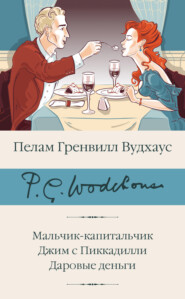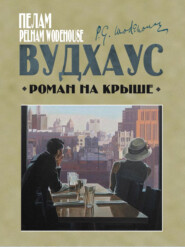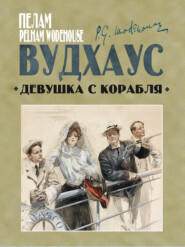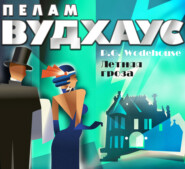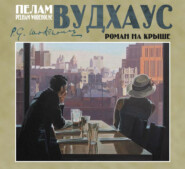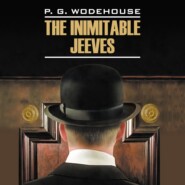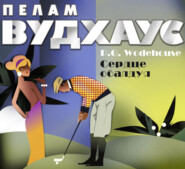По всем вопросам обращайтесь на: info@litportal.ru
(©) 2003-2025.
✖
The Inimitable Jeeves / Этот неподражаемый Дживс. Книга для чтения на английском языке
Настройки чтения
Размер шрифта
Высота строк
Поля
There was a pause. And then – well, it was a wrench, but I did it. I unstripped the cummerbund and handed it over.
"Do you wish me to press this, sir?"
I gave the thing one last, longing look. It had been very dear to me.
"No," I said, "take it away; give it to the deserving poor – I shall never wear it again."
"Thank you very much, sir," said Jeeves.
Chapter V. The pride of the Woosters is wounded
If there's one thing I like, it's a quiet life. I'm not one of those fellows who get all restless and depressed if things aren't happening to them all the time. You can't make it too placid for me. Give me regular meals, a good show with decent music every now and then, and one or two pals to totter round with, and I ask no more.
That is why the jar, when it came, was such a particularly nasty jar. I mean, I'd returned from Roville with a sort of feeling that from now on nothing could occur to upset me. Aunt Agatha, I imagined, would require at least a year to recover from the Hemmingway affair: and apart from Aunt Agatha there isn't anybody who really does much in the way of harrying me. It seemed to me that the skies were blue, so to speak, and no clouds in sight.
I little thought… Well, look here, what happened was this, and I ask you if it wasn't enough to rattle anybody.
Once a year Jeeves takes a couple of weeks' vacation and biffs off to the sea or somewhere to restore his tissues. Pretty rotten for me, of course, while he's away. But it has to be stuck, so I stick it; and I must admit that he usually manages to get hold of a fairly decent fellow to look after me in his absence.
Well, the time had come round again, and Jeeves was in the kitchen giving the understudy a few tips about his duties. I happened to want a stamp or something, and I toddled down the passage to ask him for it. The silly ass had left the kitchen door open, and I hadn't gone two steps when his voice caught me squarely in the eardrum.
"You will find Mr. Wooster," he was saying to the substitute chappie, "an exceedingly pleasant and amiable young gentleman, but not intelligent. By no means intelligent. Mentally he is negligible – quite negligible."
Well, I mean to say, what!
I suppose, strictly speaking, I ought to have charged in and ticked the blighter off properly in no uncertain voice. But I doubt whether it's humanly possible to tick Jeeves off. Personally, I didn't even have a dash at it. I merely called for my hat and stick in a marked manner and legged it. But the memory rankled, if you know what I mean. We Woosters do not lightly forget. At least, we do – some things – appointments, and people's birthdays, and letters to post, and all that – but not an absolute bally insult like the above. I brooded like the dickens.
I was still brooding when I dropped in at the oyster-bar at Buck's for a quick bracer. I needed a bracer rather particularly at the moment, because I was on my way to lunch with Aunt Agatha. A pretty frightful ordeal, believe me or believe me not, even though I took it that after what had happened at Roville she would be in a fairly subdued and amiable mood. I had just had one quick and another rather slower, and was feeling about as cheerio as was possible under the circs, when a muffled voice hailed me from the north-east, and, turning round, I saw young Bingo Little propped up in a corner, wrapping himself round a sizable chunk of bread and cheese.
"Hallo-allo-allo!" I said. "Haven't seen you for ages. You've not been in here lately, have you?"
"No. I've been living out in the country."
"Eh?" I said, for Bingo's loathing for the country was well known. "Whereabouts?"
"Down in Hampshire, at a place called Ditteredge."
"No, really? I know some people who've got a house there. The Glossops. Have you met them?"
"Why, that's where I'm staying!" said young Bingo. "I'm tutoring the Glossop kid."
"What for?" I said. I couldn't seem to see young Bingo as a tutor. Though, of course, he did get a degree of sorts at Oxford, and I suppose you can always fool some of the people some of the time.
"What for? For money, of course! An absolute sitter came unstitched in the second race at Haydock Park," said young Bingo, with some bitterness, "and I dropped my entire month's allowance. I hadn't the nerve to touch my uncle for any more, so it was a case of buzzing round to the agents and getting a job. I've been down there three weeks."
"I haven't met the Glossop kid."
"Don't!" advised Bingo, briefly.
"The only one of the family I really know is the girl." I had hardly spoken these words when the most extraordinary change came over young Bingo's face. His eyes bulged, his cheeks flushed, and his Adam's apple hopped about like one of those india-rubber balls on the top of the fountain in a shooting-gallery.
"Oh, Bertie!" he said, in a strangled sort of voice.
I looked at the poor fish anxiously. I knew that he was always falling in love with someone, but it didn't seem possible that even he could have fallen in love with Honoria Glossop. To me the girl was simply nothing more nor less than a pot of poison. One of those dashed large, brainy, strenuous, dynamic girls you see so many of these days. She had been at Girton, where, in addition to enlarging her brain to the most frightful extent, she had gone in for every kind of sport and developed the physique of a middle-weight catch-as-catch-can wrestler. I'm not sure she didn't box for the 'Varsity while she was up. The effect she had on me whenever she appeared was to make me want to slide into a cellar and lie low till they blew the All-Clear.
Yet here was young Bingo obviously all for her. There was no mistaking it. The love-light was in the blighter's eyes.
"I worship her, Bertie! I worship the very ground she treads on!" continued the patient, in a loud, penetrating voice. Fred Thompson and one or two fellows had come in, and McGarry, the chappie behind the bar, was listening with his ears flapping. But there's no reticence about Bingo. He always reminds me of the hero of a musical comedy who takes the centre of the stage, gathers the boys round him in a circle, and tells them all about his love at the top of his voice.
"Have you told her?"
"No. I haven't had the nerve. But we walk together in the garden most evenings, and it sometimes seems to me that there is a look in her eyes."
"I know that look. Like a sergeant-major."
"Nothing of the kind! Like a tender goddess."
"Half a second, old thing," I said. "Are you sure we're talking about the same girl? The one I mean is Honoria. Perhaps there's a younger sister or something I've not heard of?"
"Her name is Honoria," bawled Bingo reverently.
"And she strikes you as a tender goddess?"
"She does."
"God bless you!" I said.
"She walks in beauty like the night of cloudless climes and starry skies; and all that's best of dark and bright meet in her aspect and her eyes. Another bit of bread and cheese," he said to the lad behind the bar.
"You're keeping your strength up," I said.
"This is my lunch. I've got to meet Oswald at Waterloo at one-fifteen, to catch the train back. I brought him up to town to see the dentist."
"Oswald? Is that the kid?"
"Yes. Pestilential to a degree."
"Pestilential! That reminds me, I'm lunching with my Aunt Agatha. I'll have to pop off now, or I'll be late."
I hadn't seen Aunt Agatha since that little affair of the pearls; and, while I didn't anticipate any great pleasure from gnawing a bone in her society, I must say that there was one topic of conversation I felt pretty confident she wouldn't touch on, and that was the subject of my matrimonial future. I mean, when a woman's made a bloomer like the one Aunt Agatha made at Roville, you'd naturally think that a decent shame would keep her off it for, at any rate, a month or two.
But women beat me. I mean to say, as regards nerve. You'll hardly credit it, but she actually started in on me with the fish. Absolutely with the fish, I give you my solemn word. We'd hardly exchanged a word about the weather, when she let me have it without a blush.
"Bertie," she said, "I've been thinking again about you and how necessary it is that you should get married. I quite admit that I was dreadfully mistaken in my opinion of that terrible, hypocritical girl at Roville, but this time there is no danger of an error. By great good luck I have found the very wife for you, a girl whom I have only recently met, but whose family is above suspicion. She has plenty of money, too, though that does not matter in your case. The great point is that she is strong, self-reliant and sensible, and will counterbalance the deficiencies and weaknesses of your character. She has met you; and, while there is naturally much in you of which she disapproves, she does not dislike you. I know this, for I have sounded her – guardedly, of course – and I am sure that you have only to make the first advances – – "
"Who is it?" I would have said it long before, but the shock had made me swallow a bit of roll the wrong way, and I had only just finished turning purple and trying to get a bit of air back into the old windpipe. "Who is it?"
"Sir Roderick Glossop's daughter, Honoria."
"Do you wish me to press this, sir?"
I gave the thing one last, longing look. It had been very dear to me.
"No," I said, "take it away; give it to the deserving poor – I shall never wear it again."
"Thank you very much, sir," said Jeeves.
Chapter V. The pride of the Woosters is wounded
If there's one thing I like, it's a quiet life. I'm not one of those fellows who get all restless and depressed if things aren't happening to them all the time. You can't make it too placid for me. Give me regular meals, a good show with decent music every now and then, and one or two pals to totter round with, and I ask no more.
That is why the jar, when it came, was such a particularly nasty jar. I mean, I'd returned from Roville with a sort of feeling that from now on nothing could occur to upset me. Aunt Agatha, I imagined, would require at least a year to recover from the Hemmingway affair: and apart from Aunt Agatha there isn't anybody who really does much in the way of harrying me. It seemed to me that the skies were blue, so to speak, and no clouds in sight.
I little thought… Well, look here, what happened was this, and I ask you if it wasn't enough to rattle anybody.
Once a year Jeeves takes a couple of weeks' vacation and biffs off to the sea or somewhere to restore his tissues. Pretty rotten for me, of course, while he's away. But it has to be stuck, so I stick it; and I must admit that he usually manages to get hold of a fairly decent fellow to look after me in his absence.
Well, the time had come round again, and Jeeves was in the kitchen giving the understudy a few tips about his duties. I happened to want a stamp or something, and I toddled down the passage to ask him for it. The silly ass had left the kitchen door open, and I hadn't gone two steps when his voice caught me squarely in the eardrum.
"You will find Mr. Wooster," he was saying to the substitute chappie, "an exceedingly pleasant and amiable young gentleman, but not intelligent. By no means intelligent. Mentally he is negligible – quite negligible."
Well, I mean to say, what!
I suppose, strictly speaking, I ought to have charged in and ticked the blighter off properly in no uncertain voice. But I doubt whether it's humanly possible to tick Jeeves off. Personally, I didn't even have a dash at it. I merely called for my hat and stick in a marked manner and legged it. But the memory rankled, if you know what I mean. We Woosters do not lightly forget. At least, we do – some things – appointments, and people's birthdays, and letters to post, and all that – but not an absolute bally insult like the above. I brooded like the dickens.
I was still brooding when I dropped in at the oyster-bar at Buck's for a quick bracer. I needed a bracer rather particularly at the moment, because I was on my way to lunch with Aunt Agatha. A pretty frightful ordeal, believe me or believe me not, even though I took it that after what had happened at Roville she would be in a fairly subdued and amiable mood. I had just had one quick and another rather slower, and was feeling about as cheerio as was possible under the circs, when a muffled voice hailed me from the north-east, and, turning round, I saw young Bingo Little propped up in a corner, wrapping himself round a sizable chunk of bread and cheese.
"Hallo-allo-allo!" I said. "Haven't seen you for ages. You've not been in here lately, have you?"
"No. I've been living out in the country."
"Eh?" I said, for Bingo's loathing for the country was well known. "Whereabouts?"
"Down in Hampshire, at a place called Ditteredge."
"No, really? I know some people who've got a house there. The Glossops. Have you met them?"
"Why, that's where I'm staying!" said young Bingo. "I'm tutoring the Glossop kid."
"What for?" I said. I couldn't seem to see young Bingo as a tutor. Though, of course, he did get a degree of sorts at Oxford, and I suppose you can always fool some of the people some of the time.
"What for? For money, of course! An absolute sitter came unstitched in the second race at Haydock Park," said young Bingo, with some bitterness, "and I dropped my entire month's allowance. I hadn't the nerve to touch my uncle for any more, so it was a case of buzzing round to the agents and getting a job. I've been down there three weeks."
"I haven't met the Glossop kid."
"Don't!" advised Bingo, briefly.
"The only one of the family I really know is the girl." I had hardly spoken these words when the most extraordinary change came over young Bingo's face. His eyes bulged, his cheeks flushed, and his Adam's apple hopped about like one of those india-rubber balls on the top of the fountain in a shooting-gallery.
"Oh, Bertie!" he said, in a strangled sort of voice.
I looked at the poor fish anxiously. I knew that he was always falling in love with someone, but it didn't seem possible that even he could have fallen in love with Honoria Glossop. To me the girl was simply nothing more nor less than a pot of poison. One of those dashed large, brainy, strenuous, dynamic girls you see so many of these days. She had been at Girton, where, in addition to enlarging her brain to the most frightful extent, she had gone in for every kind of sport and developed the physique of a middle-weight catch-as-catch-can wrestler. I'm not sure she didn't box for the 'Varsity while she was up. The effect she had on me whenever she appeared was to make me want to slide into a cellar and lie low till they blew the All-Clear.
Yet here was young Bingo obviously all for her. There was no mistaking it. The love-light was in the blighter's eyes.
"I worship her, Bertie! I worship the very ground she treads on!" continued the patient, in a loud, penetrating voice. Fred Thompson and one or two fellows had come in, and McGarry, the chappie behind the bar, was listening with his ears flapping. But there's no reticence about Bingo. He always reminds me of the hero of a musical comedy who takes the centre of the stage, gathers the boys round him in a circle, and tells them all about his love at the top of his voice.
"Have you told her?"
"No. I haven't had the nerve. But we walk together in the garden most evenings, and it sometimes seems to me that there is a look in her eyes."
"I know that look. Like a sergeant-major."
"Nothing of the kind! Like a tender goddess."
"Half a second, old thing," I said. "Are you sure we're talking about the same girl? The one I mean is Honoria. Perhaps there's a younger sister or something I've not heard of?"
"Her name is Honoria," bawled Bingo reverently.
"And she strikes you as a tender goddess?"
"She does."
"God bless you!" I said.
"She walks in beauty like the night of cloudless climes and starry skies; and all that's best of dark and bright meet in her aspect and her eyes. Another bit of bread and cheese," he said to the lad behind the bar.
"You're keeping your strength up," I said.
"This is my lunch. I've got to meet Oswald at Waterloo at one-fifteen, to catch the train back. I brought him up to town to see the dentist."
"Oswald? Is that the kid?"
"Yes. Pestilential to a degree."
"Pestilential! That reminds me, I'm lunching with my Aunt Agatha. I'll have to pop off now, or I'll be late."
I hadn't seen Aunt Agatha since that little affair of the pearls; and, while I didn't anticipate any great pleasure from gnawing a bone in her society, I must say that there was one topic of conversation I felt pretty confident she wouldn't touch on, and that was the subject of my matrimonial future. I mean, when a woman's made a bloomer like the one Aunt Agatha made at Roville, you'd naturally think that a decent shame would keep her off it for, at any rate, a month or two.
But women beat me. I mean to say, as regards nerve. You'll hardly credit it, but she actually started in on me with the fish. Absolutely with the fish, I give you my solemn word. We'd hardly exchanged a word about the weather, when she let me have it without a blush.
"Bertie," she said, "I've been thinking again about you and how necessary it is that you should get married. I quite admit that I was dreadfully mistaken in my opinion of that terrible, hypocritical girl at Roville, but this time there is no danger of an error. By great good luck I have found the very wife for you, a girl whom I have only recently met, but whose family is above suspicion. She has plenty of money, too, though that does not matter in your case. The great point is that she is strong, self-reliant and sensible, and will counterbalance the deficiencies and weaknesses of your character. She has met you; and, while there is naturally much in you of which she disapproves, she does not dislike you. I know this, for I have sounded her – guardedly, of course – and I am sure that you have only to make the first advances – – "
"Who is it?" I would have said it long before, but the shock had made me swallow a bit of roll the wrong way, and I had only just finished turning purple and trying to get a bit of air back into the old windpipe. "Who is it?"
"Sir Roderick Glossop's daughter, Honoria."







